
The 5 Negative Emotions That Impede Your Work Performance

Negative emotions in the workplace can significantly impact both individual performance and overall organizational success. These emotions, if left unchecked, can derail careers and reduce productivity. Below are five major negative emotions that commonly occur in the workplace:
1. Stress
Stress is one of the most prevalent negative emotions in the workplace. It often arises from high workloads, tight deadlines, and insufficient support. Chronic stress can lead to burnout, decreased job satisfaction, and higher absenteeism. These factors can hinder career progression and increase turnover rates, ultimately affecting both personal and organizational outcomes.
2. Anger
Anger in the workplace often stems from unresolved conflicts, perceived unfairness, or unmet expectations. It can damage professional relationships, lead to poor decision-making, and result in disciplinary actions. These consequences can derail career growth and contribute to a toxic work environment, reducing collaboration and increasing turnover rates.
3. Anxiety
Anxiety is another negative emotion that is linked to job insecurity, fear of failure, and high expectations. It can lead to indecision, avoidance of challenges, and a lack of confidence, which can impede career advancement and result in missed opportunities. The World Health Organization estimates that anxiety and depression cost the global economy $1 trillion per year in lost productivity.
4. Resentment
Resentment often arises from feelings of unfair treatment, lack of recognition, or being overlooked for promotions. A survey by OfficeTeam revealed that 35% of workers admitted to feeling resentment towards colleagues who they believe were unfairly favored by management. Resentment can lead to disengagement, reduced motivation, and a decline in performance, stalling career progress and damaging one’s reputation.
5. Fear
Fear in the workplace is often related to fear of job loss, fear of failure, or fear of reprimand. A study by LinkedIn found that 31% of professionals experience fear of failure at work, which affects their ability to perform. Fear can stifle creativity, prevent employees from taking necessary risks, and result in missed opportunities, hindering career growth. Fear-driven workplaces often suffer from low innovation, leading to stagnation and decreased competitiveness in the market.
Using Emotional Intelligence to Overcome Negative Emotions
Emotional Intelligence (EI) plays a critical role in recognizing, managing, and overcoming negative emotions in the workplace. Individuals with high Emotional Intelligence (EI) excel in overcoming negative emotions like stress, anger, anxiety, resentment, and fear by leveraging several key Emotional Intelligence competencies:
Developing EI can help individuals navigate these challenges and achieve career success. Here’s how:
Self-Awareness
Self-awareness is the foundation of EI. By understanding your own emotions and triggers, you can recognize when stress, anger, anxiety, resentment, or fear is affecting you. This awareness allows you to take proactive steps to manage these emotions before they escalate. High-EI individuals are highly self-aware, which allows them to recognize when they are experiencing negative emotions. This awareness is the first step in managing these emotions effectively.
Mindfulness, a key aspect of Self Awareness, involves being present and fully engaged in the moment. it involves being aware of your thoughts, feelings, and sensations by paying close attention to what’s happening within and around you.
Mindfulness also helps individuals stay grounded in the present, reducing the overwhelming influence of future uncertainties and fears. By focusing on what can be controlled now, individuals can approach situations with greater calmness and confidence.
Mindfulness also helps individuals break the cycle of anxious thoughts by focusing on the present. It calms the mind and body, reducing the intensity of anxiety and enabling a more composed and confident approach to challenges.
By staying present, observing emotions without judgment, and responding thoughtfully, individuals can manage these emotions effectively, leading to greater emotional resilience, improved relationships, and a more positive and productive work environment.


